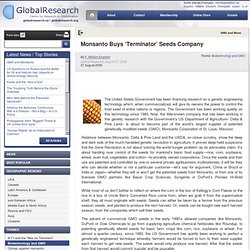

Raw foods. Vegan Sites. MONSANTO / OGM. Monsanto. MONSANTO. The future of food. Environmental toxicology & chemical fate and transport. (Dangers of) the Genetically Modified/Engineered (GMOs) Good Food Bad Food.
Monsanto. Monsanto. Roundup: Birth Defects Caused By World's Top-Selling Weedkiller, Scientists Say. WASHINGTON -- The chemical at the heart of the planet’s most widely used herbicide -- Roundup weedkiller, used in farms and gardens across the U.S. -- is coming under more intense scrutiny following the release of a new report calling for a heightened regulatory response around its use.

Critics have argued for decades that glyphosate, the active ingredient in Roundup and other herbicides used around the globe, poses a serious threat to public health. Industry regulators, however, appear to have consistently overlooked their concerns. Critics have argued for decades that glyphosate, the active ingredient in Roundup and other herbicides used around the globe, poses a serious threat to public health. Industry regulators, however, appear to have consistently overlooked their concerns. Founded in 2009, Earth Open Source is a non-profit organisation incorporated in the U.K. but international in scope. “We did not do the actual basic research ourselves,” said Fagan. New Zealand’s Love Canal « The Most Revolutionary Act. Grand Distraction. Monsanto is a true multinational agricultural corporation which, according to their website, is dedicated to creating a better future for human beings, the environment, and local economies through providing products that allow farmers to produce higher yields and overall increased agricultural productivity.

Monsanto’s line of products include Posilac, RoundUp, 245T, DDT, and Nutrasweet. Posilac, which is also known as rBGH (recombinant Bovine Growth Hormone), is a genetically modified variation of the natural growth hormone produced by cows. This allows lactating dairy cattle to produce 10 to 20% more milk. In cattle alone, it is clinically proven to increase incidences of mastitis (an infection causing inflammation of the breasts), lameness (where the animal fails to travel in a regular and sound manner on all four feet by various causes), and reproductive complications. Terminator seeds Monsanto. Earth Island Journal, Fall, 1998 The 12,000-year-old practice in which farm families save their best seed from one year's harvest for the next season's planting may be coming to an end by the year 2000.

In March 1998, Delta ~ Pine Land Co. arid the US Department of Agriculture (USDA) announced they had received a US patent on a new genetic technology designed to prevent unauthorized seed-saving by farmers. The patented technology enables a seed company to genetically alter seed so that the plants that grow from it are sterile; farmers cannot use their seeds. The patent is broad applying to plants and seeds of all species including both transgenic (genetically engineered) and conventionally-bred seeds.
USDA Approves Terminator Seed Technology Despite Opposition. Terminator Seed Rejected In UN Meeting In Brazil! Terminator Seeds. ABCNEWS.com : The Debate Over Creating Sterile Seeds. By Erin HayesABCNEWS.comR E E D, Ky., Aug. 2— This is how it has worked for centuries: farmers harvest a crop and hold back some of the seeds to plant next year’s crop.

In nature’s cycle, one harvest creates the next. But science has come up with a method to stop that cycle and to make crops sterile. Farmers welcome halt of 'terminator' By Habib Beary in Bangalore Indian farmers have welcomed the decision by the American biotechnology company Monsanto not to develop its so-called "terminator gene" technology for genetically-modified crops.

Monsanto Buys ‘Terminator’ Seeds Company. The United States Government has been financing research on a genetic engineering technology which, when commercialized, will give its owners the power to control the food seed of entire nations or regions.

The Government has been working quietly on this technology since 1983. Now, the little-known company that has been working in this genetic research with the Government’s US Department of Agriculture– Delta & Pine Land– is about to become part of the world’s largest supplier of patented genetically-modified seeds (GMO), Monsanto Corporation of St. Louis, Missouri. Relations between Monsanto, Delta & Pine Land and the USDA, on closer scrutiny, show the deep and dark side of the much-heralded genetic revolution in agriculture. It proves deep-held suspicions that the Gene Revolution is not about ‘solving the world hunger problem’ as its advocates claim. Terminator Seeds: Monsanto Moves to Tighten Its Grip on GIobal Agriculture.
By Hope Shand Multinational Monitor magazine, November 1998.

Terminator Technology. Author and Page information by Anup ShahThis Page Last Updated Saturday, July 14, 2001 There is a technology available suitably called the Terminator technology, which is designed to genetically switch off a plant's ability to germinate a second time.

A half-century after the Bengal famine [where, during British colonial rule, most of the food grown was exported for trade and for UK, instead of feeding hungry local people], a new and clever system has been put in place which is once again making the theft of the harvest a right and the keeping of harvest a crime. Hidden behind complex free-trade treaties are innovative ways to steal nature's harvest, the harvest of the seed, and the harvest of nutrition. — Vandana Shiva, Stolen Harvest (South End Press, 2000), p.6.
Terminator Technology: Suicide Seeds Are Back! / Introduction / The Issues / Ban Terminator - Ban Terminator.